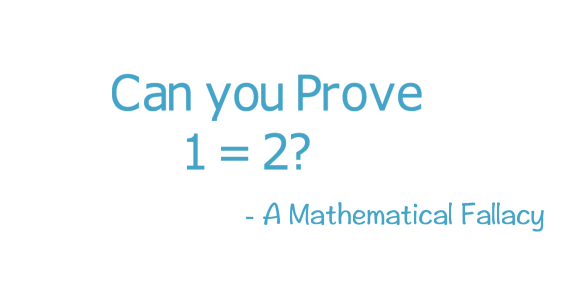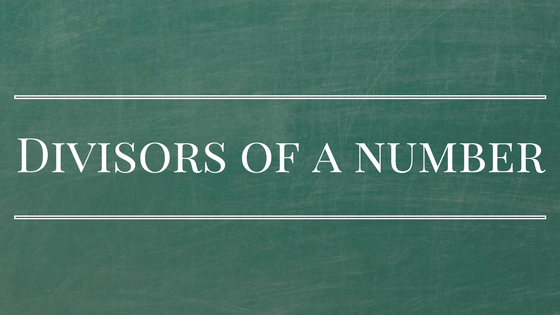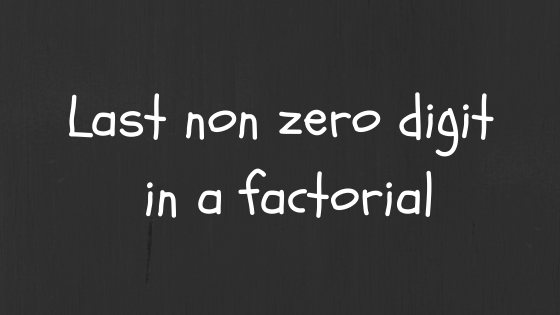
Solving Absolute Value Equations
July 16, 2015
Can you Prove 1 = 2? – A Classic Mathematical Fallacy
January 19, 2018In this post, we will look into the divisibility rules for numbers from 2 to 13 with the help of concrete examples which aid us in division tests. We will start by understanding the divisibility rule and then look into the respective division rules for numbers from 2 to 13.
What is a Divisibility Rule?
Given a number $x$, divisibility rules helps us in testing if that number is divisible by a number say $y$ with out even performing the actual division. Divisibility rules are quite handy when you want to test for divisibility of numbers even before you can actual divide the number. In this post we will look into the divisibility rule for the respective numbers from 2 to 13.
Divisibility Rule of 2
To check if a number is divisible by 2, all you need to do is check whether the digit at the units place of the number is 0 or multiple of 2. In other words if the units digit of the number is even, then the number is divisible by 2.
The numbers 64, 762, 540, 634, 758, 976 are divisible by 2 as their units digit is even.
And numbers 121, 463, 575, 647, 789 are not multiples of 2 as their units digit is odd.
Now what about 135648327896. Look at the units digit of the number, it ends in 6, which is an even number and hence satisfies our rule.
Divisibility Rule of 3
For a number N to be divisible by 3, you have to find the sum of the digits of that numbers. If the sum of the digits of that number is divisible by 3 then then number is definitely divisible by 3.
Example: 1461
Consider 1461, The sum of its digits is 1+4+6+1 = 12. 12 is a multiple of 3. Hence 1461 is also a multiple of 3.
Example: 12332
Consider 12332, The sum of its digits is 1+2+3+3+2 = 11. 11 is not a multiple of and hence is not divisible by 3
Example: 267345
The sum of its digits is 2+6+7+3+4+5 = 27. 27 is a multiple of 3. Hence 123321 is divisible by 3
Example: 9745321
The sum of the digits of this number are 9+7+4+5+3+2+1 = 31. 31 is not a multiple and hence is not divisible by 3
Divisibility rule of 4
The rule of 2 requires us to check the last digit of the number. For rule of 4 we will have to check whether the last two digits of the numbers are multiples of 4.
Example: 412
Here the last two digits 12 is a multiple of 4. Hence is divisible by 4.
Example: 53217
The last two digits of 53217 is 17 which is not a multiple of 4 and hence 53217 is not a multiple of 4.
Example: 67549
The last two digits 49 is not a multiple of 4 and hence is not divisible by 4.
Example: 123496
The last two digits 96 is divisible by 4, hence 123496 is a multiple of 4.
Division rule of 5
This is pretty straight forward. All you need to check is whether the last digit of the number is 0 or 5. If yes, the number is multiple of 5
The numbers 45, 50, 735, 8730, 97695 are all divisible by 2 as their units digit is either 0 or 5
While the numbers 476, 1234, 3562, 7659, 99999 are divisible by 5 as their their units digit is not 0 or 5.
Division rule of 6
To check if a number is a multiple of 6, we have to check if the number satisfies the following two conditions
- It must be a multiple of 2: Number must be even
- It must be a multiple of 3: Sum of the digits of the number must be multiple of 3.
Example: 126
The number ends in 6 which is even and hence its divisible by 2 and the sum of its digits is 9, which is a multiple of 3. Since the number satisfies both the cases, the number is divisible by 6.
Example: 3412
The number ends in 2 which is even and hence it is divisible by 2 and the sum of its digits is 10, which is not a multiple of 3. Since the number is not divisible by 3, the number is not divisible by 6 even though it is a multiple of 2.
Example: 46239
The number is not divisible by 2 as it is not even. Hence it is not a multiple of 6 as well.
Example: 96312
The number ends in 2 which is even and the sum of its digits is 21, which is a multiple of 3. Since the number satisfies both the cases, the number is divisible by 6.
Divisibility rule of 7
To check if a number is divisible by 7, the general divisibility rule for 7 is to
- Double the units digit of the number, and subtract it from the rest of the number.
- If the answer obtained is divisible by 7, then the actual number is divisible by 7.
- If you are not sure about the obtained answer’s divisibility, apply the rule again on the answer.
Example: 126
- Double the units digit 6, which gives 12
- Subtract 12 from the rest of the number i.e 12 – 12= 0
Since 0 is divisible by 7. 126 is divisible by 7
Example: 672
- Multiply the last digit 2 by 2 which gives 4.
- Subtract 4 from the rest of the number i.e 67 – 4 = 63.
Since 63 is multiple of 7. 672 is divisible by 7
Example: 1436
- Multiply the last digit 6 by 6 which gives 36.
- Subtract 36 from the rest of the number i.e 143 – 36 = 107.
- Not sure if divisible? Lets repeat the process: double the units digit 7: 2×7 = 14
- Subtract 14 from the rest of the number 10 – 14 = -4
Since -4 is not divisible by 7. 1436 is not divisible as well.
Example: 5201
- Double the units digit: 2×1 = 2
- Subtract 2 from 520=> 518
- Double the units digit 8=> 16
- Subtract 16 from 51 => 35
Since 35 is a multiple of 7, 5201 is divisible by 7.
Example: 156735
- Double the units digit 5×2 => 10
- Subtract 10 from 15673 => 15663
- Double the units digit 3 => 6
- Subtract 6 from 1567 => 1561
- Double the units digit 1 => 2
- Subtract 2 from 156 => 154
- Double the units digit 4 => 8
- Subtract 8 from 15 => 7
Since 7 is multiple of 7. Hence 156735 is divisible by 7
Divisibility rule of 8
The rule of 2 requires us to check the last digit of the number. The rule of 4 requires us to check the last two digits of the number. For rule of 8, we have to check whether the last three digits of the number is divisible by 8.
In general, to check if a number is divisible by 2, 2$^2$, 2$^3$, 2$^4$,… 2$^n$ we need to check the last n digits of that number. Lets look some of the examples on division rules for 8.
Example: 1824
The last three digits 824 when divided by 8 gives 103. Since 824 is divisible, 1824 is divisible by 8 as well. In fact, numbers 2824, 9824, 10824 etc are also multiples of 8 as their last there digits 824 is multiple of 8.
Example: 45673
Here, a number that is multiple of 8 will never be an odd number. Hence we can easily identify that 45673 is not divisible by 8.
Example: 12474
Here, the last three digits 474 when divided by 8 leaves a remainder 2. Hence 12474 is not divisible by 8.
Example: 26032
Since the last three digits 032 is divisible by 8. The number 26032 is divisible by 8
Division rule for 9
This rule is exactly the same as divisibility of 3, where in we check for divisibility by finding the sum of the digits of the number. If the sum of digits is a multiple of 9, the number is divisible by 9.
Example: 126
The sum of the digits is 1+2+6 = 9, which is a multiple 9. Hence 126 is divisible by 9.
Example: 4329
The sum of the digits is 4+3+2+9 = 18, is a multiple of 9 and hence 4329 is divisible by 9.
Example: 14574
The sum of the digits is 1+4+5+7+4 = 19, is not divisible by 9. Hence 14574 is not a multiple of 9.
Example: 11106
The sum of the digits is 1+1+1+0+6 = 9, which is a multiple 9. Hence 11106 is divisible by 9.
Division rule for 10
This simply involves check whether the number ends in 0. If yes, the number is a multiple of 0.
The numbers 30, 550, 7360, 8730, 92950 are all divisible by 10 as the number ends in 0.
While the numbers 45, 123, 3647, 23429 do not end in 0 and hence are not divisible by 10.
Divisibility rule of 11
To check if a number is divisible by 11, we subtract the sum of the digits in even numbered places with the sum of the digits in odd numbered places and check if the resulting value is divisible by 11. In other words, if the difference of the alternative digits of the number is a multiple of 11 then the number must be divisible by 11
Example: 451
Sum of the digits in even places is 5
Sum of the digits in odd places is 4+1 = 5
Difference in the even and odd places sum is 5 – 5 = 0, which is divisible by 11.
Hence 451 is divisible by 11
Example: 4372
Sum of the digits in even places is 4 + 7 = 11
Sum of the digits in odd places is 3 + 2 = 5
Difference in the even and odd places sum is 11 – 5 = 6, which is not a multiple of 11.
Hence 4372 is not divisible by 11
Example: 92653
Sum of the digits in even places is 2+5 = 7
Sum of the digits in odd places is 9+6+3=18
Difference in the even and odd places sum is 18-7 = 11, which is a multiple of 11 and hence 92563 is divisible by 11.
Example: 107415
Sum of the digits in even places is 1+7+1=9
Sum of the digits in odd places is 0+4+5 = 9
Difference in the even and odd places sum is 9-9=0, which is divisible by 11.
Hence 107415 is divisible by 11
Divisibility rule of 12
Similar to the rule of 6, for a number to be multiple of 12 it must satisfy two cases:
- It must be multiple of 3
- It must be multiple of 4
Example: 132
Sum of the digits is 1+3+2 = 6, which is a multiple of 3. Hence the number is divisible by 3.
Last two digits of 32 is multiple of 4. Hence the number is divisible by 4.
Since the number is divisible by 3 and 4. The number is divisible by 12.
Example: 1462
Sum of the digits is 1+4+6+2 = 13, is not a multiple of 3. Hence the number is not divisible by 12.
Example: 1203
Sum of the digits is 1+2+0+3 = 6, which is a multiple of 3. Hence the number is divisible by 3.
Last two digits 03 is not a multiple of 4. Hence the number is not divisible by 12
Divisibility rule of 13
To check if a number is divisible by 13, we multiply the last digit by 9, then subtract it from the rest of the number. If the result obtained is divisible by 13, then the number is divisible by 13
Example: 247
- Multiply 7 by 9, which gives 63.
- Subtract 63 from 24, which gives -39.
-39 is divisible by 13. Hence 247 is divisible by 13.
Example: 2365
- Multiply 5 by 9, which gives 45.
- Subtract 45 from 236, which gives 191.
- Multiply 1 by 9 => 9
- Subtract 9 from 19 => 10
10 is not divisible by 13. Hence 2365 is not divisible by 13.
Example: 3159
- Multiply 9 by 9, which gives 81.
- Subtract 81 from 315, which gives 234.
- Multiply 4 by 9 => 36
- Subtract 36 from 23 => -13
-13 divisible by 13. Hence 3159 is a multiple of 13.
Example: 46793
- Multiply 3 by 9, which gives 27.
- Subtract 27 from 4679, which gives 4652.
- Multiply units digit 2 by 9 = 18
- Subtract 18 from 465 => 447
- Multiply 7 by 9 => 63
- Subtract 63 from 44
19 is not a multiple of 13. Hence 46793 is not divisible by 13
What Next?
Please do try our android app – Math Tricks Workout. The app is developed to improve mental arithmetic using a series of left to right fast math workouts.




1 Comment
It is very helpful for me